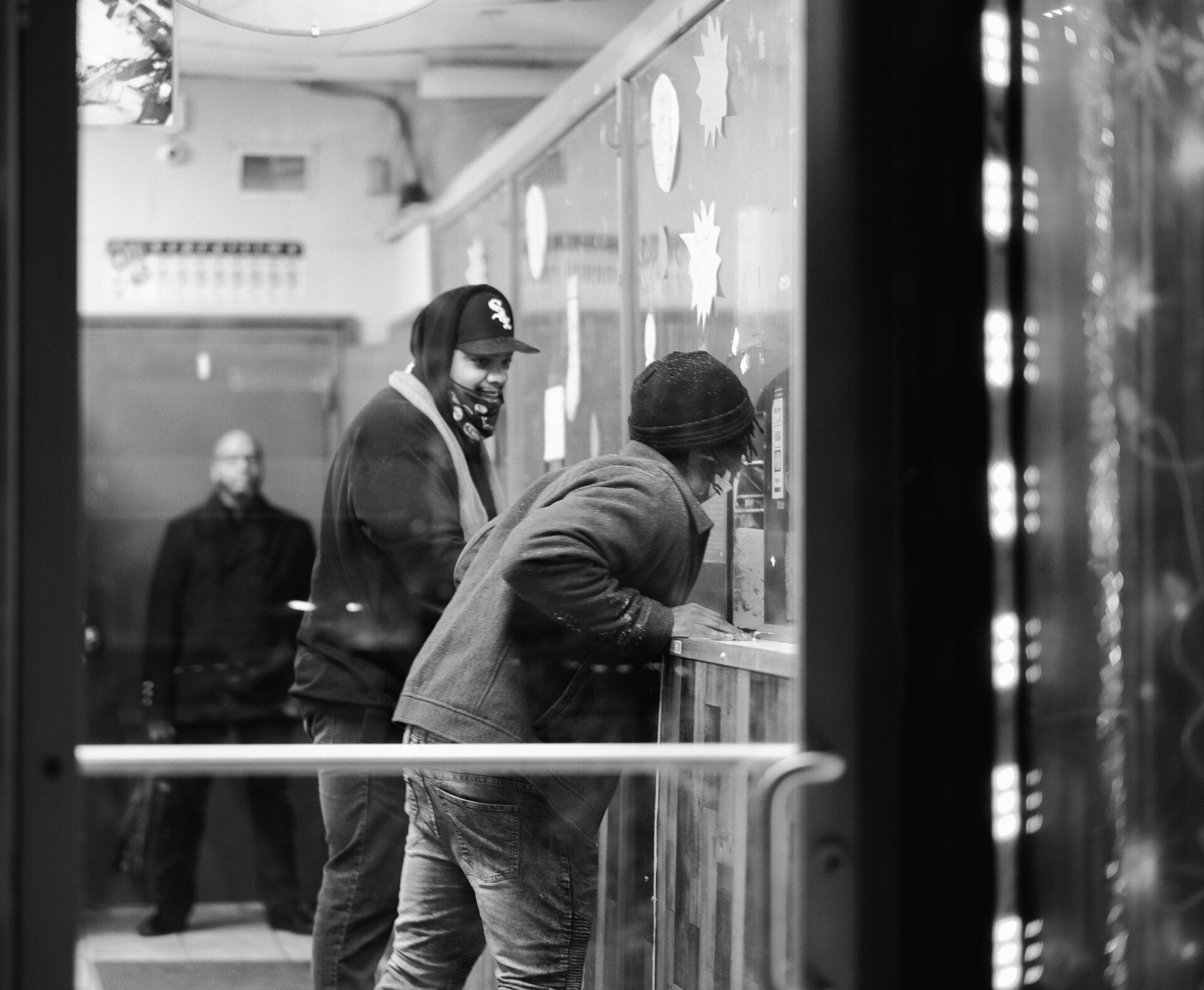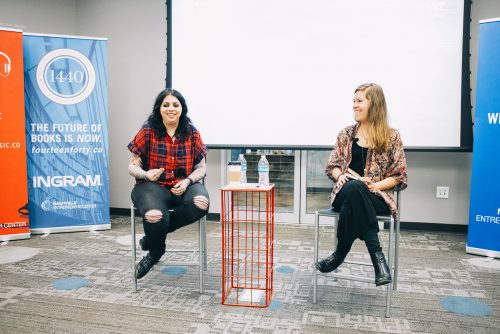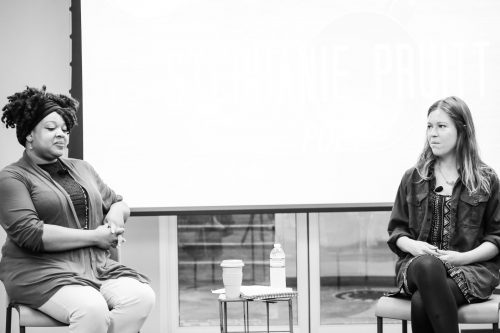In terms of stature, 6’3″ Emmy-award-winning director and former football player Marquis Simmons might be intimidating. However, once you get past his burly figure and the fact that Simmons has won an insane amount of film festival awards (150+) the intimidation stops there. The sensitive director, who simply wants to create characters that stick with his audiences, loves exploring make-or-break journeys. As someone who is gifted at looking for the good, Simmons is the perfect person to tackle triggering topics like sexual assault and street violence. Even his films like the gritty short “Broke Down Drone” which focuses on street violence in his native Chicago, give the viewer hope. Having grown up around gangs and seeing what the wrong path can do to you, Simmons wants to show the power of taking the straight and narrow. He is overflowing with appreciation for how his life turned out.
Fast-talking, opinionated, and unafraid to pounce on what he wants one can see an athletic discipline throughout the artist’s nature. Simmons is unafraid to put himself out there which is why he has attracted award-winning projects like NBC’s “The Delta: The Lost Story of Emmett Till.” He has the confidence that comes from having studied his craft and also the pragmatism of a former athlete. Life is a numbers game and Simmons is unafraid to constantly put himself out there knowing he might not make every shot. Yet, his focus is for real. Since deciding that he wanted to become a director he has distilled every project, from commercials to music videos, down to one simple question: “What can I learn from this that will move me closer to my goal of telling narrative stories more effectively?” The born ‘n’ bred Chicagoan sets an example that anything is possible as long as you stay on your own side.
You have won a lot of film festival awards. What has been your secret to doing so well in that market?
Plenty! Like anything in life, the secret is finding festivals that you have relationships with that also fit your film’s genre. While I have received a lot of acceptance and rejection letters, I always focus on the fact that I am betting on myself. Even if someone says “no” I try not to take it personally. At the next stage in the game, they might want to hire me. It’s all just part of the filmmaking process. What really matters is finding your niche, audience relatability, and getting your vision across.
So true. Striking visuals tend to drive your films even more than characters or dialogue. How did you come up with your signature style?
At Columbia College, I had a mentor named Thomas McIntosh, a photographer, who schooled me in cinematography and how to capture a moment in time. Learning key principles was such an important step in my progression as a director. It allowed me to provide guidance to my cinematographer on set and then redirect my attention to the other elements of the filmmaking process. Making music videos also gave me a ton of practice in terms of understanding visuals. While my signature style is always developing, it is most easily defined by moving the camera fluidly and intimately within a space. As far as the narrative goes, my films always pick up in the middle of a situation. From there, the story starts to unravel as to how the characters got there.
A lot of music video directors get stuck in that genre out of fear or because it can be financially lucrative. How did you get out?
A lot of great directors start off doing music videos. I believed from the start that it would be a fantastic launching pad that would propel me forward to the types of stories I wanted to tell. My ambition was always to make everything as aesthetically pleasing as possible so it would leave people wanting more.
Something I have consistently done since childhood is study the best of the best in any industry who set the standard for their peers. When I decided that I wanted to make features I started studying the top directors, from local artists to household names, to see how they executed their vision. A question I constantly asked myself was “What are the key things that made people go crazy for this film?”
You had a great experience studying filmmaking at Columbia College and Arizona State. How did studying filmmaking in a formal environment professionally prepare you?
At Arizona State, professional writers and directors would visit the campus and talk to the students about their careers. Afterward, they would host meet ‘n’ greets at the professors’ offices. Oddly, only a few students would show up even though they had the opportunity to meet legends from shows like “The Fresh Prince of Bel-Air” or films like “Ghostbusters.” Being able to pick the brains of people at the top of their game taught me that the industry is business, rather than glitz and glamour, and can be brutal. When I got to Columbia, I was already mentally prepared and ready to create right out of the gate. I just wanted to get into the physical side of filmmaking.
What was the best piece of advice that you received from any mentor early on?
“Create shit” which came from my professor Kevin Sandler at Arizona State University. Everything just fell into place from that moment on because I carried that piece of advice with me everywhere. I also learned a lot from my mentors about humility. As an artist, you have to be unafraid to admit what you do not know. Asking for critiques can make you insecure and be a hard pill to swallow. But, I knew that even if someone said they didn’t like my work it was necessary to hear that in order for me to become better. Knowing I wasn’t the best immediately allowed me to build on what I knew and grow from there. I thank my football coaches for teaching me the importance of listening to others. While you might not always agree with that person it will always give you something to think about.
Let’s talk about “Broke Down Drone” which is extremely intense in terms of subject matter. What was it like tackling violence in such a visceral way?
First and foremost, I love G. Rilly Mills and Willie Round who wrote this incredible story and allowed me to direct their script, and Tony Chatman who trusted my vision. I wanted to strike a balance between relatability and presenting situations that people can become more curious about. The drone is a symbol of hope and black boy joy. Especially at a time when there is so much negativity in Chicago and the city feels very compartmentalized, a lot of young black men are being affected by that. They want to make it out of their circumstances and yet have no direction. I wanted to capture that feeling of being stuck. Even if you have a billion views on Youtube, sometimes it can feel like there is no way out.
Perhaps the most disturbing part of the film was how the main character witnesses a murder and is somehow able to shut it down in order to function. It reminded me of how the general public has become accustomed to mass shootings and not in a good way.
Exactly. Whether it is North Lawndale, Garfield Park, or the south side of Englewood, violence is normal to these men. To show the main character standing at a microphone trying to write after witnessing a murder was my way of speaking to the fact that everyone processes trauma differently. I wanted my audience to watch him and say, “I know how that feels.”
As a filmmaker, you cover pretty heavy subject matter like sexual assault in your new film “Faith Interrupted” and street violence in “Broke Down Drone.” Does it ever become hard to detach from those kinds of projects so you don’t become depressed?
Sensitive, triggering material is something I understand how to convey even if it is difficult to tackle and for other people to watch. I am self-protective and try not to dwell on negativity. As my dad would say, “Time is like a freight train coming at you. It’s not going to stop and you can’t go backward.” I stay a happy, high-energy guy by looking for solutions to the problems that I explore rather than letting them bog me down. Even if I am dealing with something hurtful, hard, and dark I am always looking for an element of hope. Every day people become stronger because of what they are able to make it through. My goal is to always provide a positive example for the people coming up behind me.
Sheer perseverance can be a self-fulfilling prophesy. By plugging along and maintaining the right mindset you’re able to withstand the days that don’t go your way.
Exactly. I have the best male role models in my life who I always listened to and watched. My dad is the strongest of them all and such a positive individual. He is funny as all get out but also very serious when it comes to his children. Since he put a lot into me, there were very high expectations. He was there to instill a healthy kind of fear in a positive way.
You have received a “Human Rights” award at several film festivals, which is one of the most prestigious awards and also a huge honor as a creative. What did that feel like?
To be able to shed light on a very sensitive topic and help someone heal is amazing. Surreal, incredible, and extremely grateful are all words I would use to describe that accomplishment. To have your message resonate with an audience on such a deep level makes me realize that the movies I’ve made are bigger than me.
There is no better time than right now to be an African American filmmaker. How do you feel about representing your peers in this canon?
John Singleton, Tyler Perry, the late great Oscar Micheaux, Ava Duvernay, and Jordan Peele have all set trails for people like myself to follow. They are allowing my own voice to be heard. As someone who has so much to say and creates from a pure place, it is so exciting to also be given this opportunity. Aside from the other African American filmmakers that I admire, it is the sacrifices that my parents made that keep me going. Ever since I was a kid, I’ve always known that I need to shed a positive light on my last name. Secondly, I think a lot about the schools that I went to where gang activity and violence were rampant, and a lot of us had no hope. I would like to one day be able to create after-school film programs that help keep kids off the streets so they can also do what they love.
Learn more about Marquis Simmons and view his complete filmography here




